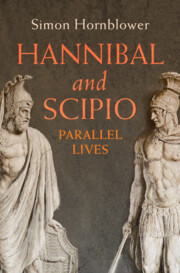125 results

Hannibal and Scipio
- Parallel Lives
- Coming soon
-
- Expected online publication date:
- August 2024
- Print publication:
- 31 August 2024
-
- Book
- Export citation
Manuscripts
-
- Book:
- Livy: <I>Ab urbe</I> <I>condita</I> Book XXII
- Print publication:
- 29 October 2020, pp -
-
- Chapter
- Export citation
Preface and Acknowledgments
-
- Book:
- Livy: <I>Ab urbe</I> <I>condita</I> Book XXII
- Print publication:
- 29 October 2020, pp -
-
- Chapter
- Export citation
Maps
-
- Book:
- Livy: <I>Ab urbe</I> <I>condita</I> Book XXII
- Print publication:
- 29 October 2020, pp -
-
- Chapter
- Export citation
Commentary
-
- Book:
- Livy: <I>Ab urbe</I> <I>condita</I> Book XXII
- Print publication:
- 29 October 2020, pp -
-
- Chapter
- Export citation
List of Abbreviations
-
- Book:
- Livy: <I>Ab urbe</I> <I>condita</I> Book XXII
- Print publication:
- 29 October 2020, pp -
-
- Chapter
- Export citation
Contents
-
- Book:
- Livy: <I>Ab urbe</I> <I>condita</I> Book XXII
- Print publication:
- 29 October 2020, pp -
-
- Chapter
- Export citation
Indexes
-
- Book:
- Livy: <I>Ab urbe</I> <I>condita</I> Book XXII
- Print publication:
- 29 October 2020, pp -
-
- Chapter
- Export citation
TITI LIVI AB VRBE CONDITA LIBER XXII
-
- Book:
- Livy: <I>Ab urbe</I> <I>condita</I> Book XXII
- Print publication:
- 29 October 2020, pp -
-
- Chapter
- Export citation
Dedication
-
- Book:
- Livy: <I>Ab urbe</I> <I>condita</I> Book XXII
- Print publication:
- 29 October 2020, pp -
-
- Chapter
- Export citation
Introduction
-
- Book:
- Livy: <I>Ab urbe</I> <I>condita</I> Book XXII
- Print publication:
- 29 October 2020, pp -
-
- Chapter
- Export citation
Frontmatter
-
- Book:
- Livy: <I>Ab urbe</I> <I>condita</I> Book XXII
- Print publication:
- 29 October 2020, pp -
-
- Chapter
- Export citation
Works Cited
-
- Book:
- Livy: <I>Ab urbe</I> <I>condita</I> Book XXII
- Print publication:
- 29 October 2020, pp -
-
- Chapter
- Export citation
Chapter 3 - Hellenistic Tragedy and Satyr-Drama; Lycophron’s Alexandra
- from Part I - Texts
-
-
- Book:
- Greek Tragedy After the Fifth Century
- Published online:
- 30 November 2018
- Print publication:
- 13 December 2018, pp 90-124
-
- Chapter
- Export citation
List of Abbreviations
-
- Book:
- Herodotus: <I>Histories</I> Book VI
- Published online:
- 14 September 2019
- Print publication:
- 21 December 2017, pp xi-xv
-
- Chapter
- Export citation
Preface
-
- Book:
- Herodotus: <I>Histories</I> Book VI
- Published online:
- 14 September 2019
- Print publication:
- 21 December 2017, pp ix-x
-
- Chapter
- Export citation
List of Abbreviations
-
- Book:
- Herodotus: <I>Histories</I> Book VI
- Published online:
- 14 September 2019
- Print publication:
- 21 December 2017, pp xi-xv
-
- Chapter
- Export citation
Title match
ΕΡΑΤω
- from ΗΡΟΔΟΤΟΥ ΙΣΤΟΡΙωΝ Ζ
-
- Book:
- Herodotus: <I>Histories</I> Book VI
- Published online:
- 14 September 2019
- Print publication:
- 21 December 2017, pp 41-84
-
- Chapter
- Export citation
List of Maps
-
- Book:
- Herodotus: <I>Histories</I> Book VI
- Published online:
- 14 September 2019
- Print publication:
- 21 December 2017, pp vi-vi
-
- Chapter
- Export citation
Commentary
- from ΗΡΟΔΟΤΟΥ ΙΣΤΟΡΙωΝ Ζ
-
- Book:
- Herodotus: <I>Histories</I> Book VI
- Published online:
- 14 September 2019
- Print publication:
- 21 December 2017, pp 85-302
-
- Chapter
- Export citation



